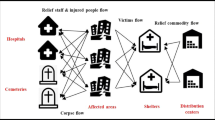Abstract
Large scale disasters, natural or human-made, have huge consequences on people and infrastructures. After a disaster strikes, the distribution of humanitarian aid to the population affected is one of the main operations to be carried out, and several crucial decisions must be made in a short time. This paper addresses a last-mile distribution problem in disaster relief operations, under insecure and uncertain conditions. A model is presented that takes into account the cost and time of operation, the security and reliability of the routes, and the equity of aid handed out. The output of the model consists of a detailed set of itineraries that can be used to build an implementable distribution plan. Given its high complexity, the resulting problem is solved using a multi-criteria metaheuristic approach. In particular, a constructive algorithm and a GRASP based metaheuristic are developed, which are tested in a case study based on the 2010 Haiti earthquake.









Similar content being viewed by others
Notes
For additional details regarding the algorithms proposed in this paper, please contact the authors.
References
Balcik, B., Beamon, B.M.: Facility location in humanitarian relief. Int. J. Logist. Res. Appl. 11(2), 101–121 (2008)
Bozorgi-Amiri, A., Jabalameli, M.S., Al-e Hashem, S.M.J.M.: A multi-objective robust stochastic programming model for disaster relief logistics under uncertainty. OR Spectr. 35, 905–933 (2013)
Feo, T., Resende, M.: A probabilistic heuristic for a computationally difficult set covering problem. Oper. Res. Lett. 8(2), 67–71 (1989)
Feo, T., Resende, M.: Greedy randomized adaptive search procedures. J. Global Optim. 6, 109–113 (1995)
Ferrer, J.M., Ortuño, M.T., Tirado, G., Vitoriano, B.: Heuristics for the design of safe humanitarian aid distribution itineraries. In: Mora, A., Squillero, G. (eds.) EvoApplications 2015. Lecture Notes in Computer Science, vol. 9028, pp. 721–731. Springer, Heidelberg (2015)
Festa, P., Resende, M.: Grasp: An annotated bibliography. In: Ribeiro, C., Hansen, P. (eds.) Essays and Surveys on Metaheuristics, pp. 325–367. Kluwer Academic Publishers, Dordrecht (2002)
Ford, L.R., Fulkerson, D.R.: Maximal flow through a network. Canad. J. Math. 8(3), 399–404 (1956)
Greistorfer, P.: A tabu scatter search metaheuristic for the arc routing problem. Comput. Ind. Eng. 44(2), 249–266 (2003)
Holguín-Veras, J., Pérez, N., Jaller, M., Van Wassenhove, L., Aros-Vera, F.: On the appropriate objective function for post-disaster humanitarian logistics models. J. Oper. Manag. 31, 262–280 (2013)
Huang, K., Jiang, Y., Yuan, Y., Zhao, L.: Modeling multiple humanitarian objectives in emergency response to large-scale disasters. Transp. Res. Part E 75, 1–17 (2015)
Huang, M., Smilowitz, K., Balcik, B.: Models for relief routing: equity, efficiency and efficacy. Transp. Res. Part E 48(1), 2–18 (2012)
Kovács, G., Spens, K.M.: Humanitarian logistics in disaster relief operations. Int. J. Phys. Distrib. Logist. Manag. 37(2), 99–114 (2007)
Nolz, P., Doerner, K., Gutjahr, W., Hartl, R.: A bi-objective metaheuristic for disaster relief operation planning. In: Coello Coello, C., Dhaenens, C., Jourdan, L. (eds.) Advances in Multi-Objective Nature Inspired Computing, Studies in Computational Intelligence, vol. 272, pp. 167–187. Springer, Berlin Heidelberg (2010)
OCHA (2013) Ocha: Office for the coordination of humanitarian affairs. http://ochaonline.un.org/ [date accesed 8 Jan 2013]
Ortuño, M., Tirado, G., Vitoriano, B.: A lexicographical goal programming based decision support system for logistics of Humanitarian Aid. TOP 19, 464–479 (2011)
Ortuño, M., Cristobal, P., Ferrer, J., Martin-Campo, F., Muñoz, S., Tirado, G., Vitoriano, B.: Decision aid models and systems for humanitarian logistics. A survey. In: Decision Aid Models for Disaster Management and Emergencies, Atlantis Computational Intelligence Systems, pp. 17–44. Springer, New York (2012)
Ozdamar, L., Ertem, M.: Models, solutions and enabling technologies in humanitarian logistics. Eur. J. Oper. Res. (2014). doi:10.1016/j.ejor.2014.11.030
Redhumorg: Red de información humanitaria para américa latina y el caribe (2015). http://www.redhum.org/mapas [date accesed 12 Feb 2015]
Resende, M., Ribeiro, C.: Greedy randomized adaptive search procedures. In: Glover, F., Kochenberger, G. (eds.) Handbook of Metaheuristics, pp. 219–249. Kluwer Academic Publishers, Dordrecht (2003)
Ribeiro, M.H., Plastino, A., Martins, S.L.: Hybridization of grasp metaheuristic with data mining techniques. J. Math. Model. Algorithms 5(1), 23–41 (2006)
Tirado, G., Martin-Campo, F., Vitoriano, B., Ortuño, M.T.: A lexicographical dynamic flow model for relief operations. Int. J. Comput. Intell. Syst. 7(sup1), 45–57 (2014)
Tomasini, R., van Wassenhove, L.: From preparedness to partnerships: case study research on humanitarian logistics. Int. Trans. Oper. Res. 16(5), 549–559 (2009)
Tzeng, G.H., Cheng, H.J., Huang, T.D.: Multi-objective optimal planning for designing relief delivery systems. Transp. Res. Part E 43(6), 673–686 (2007)
Viswanath, K., Peeta, S.: Multicommodity maximal covering network design problem for planning critical routes for earthquake response. J. Transp. Res. Board 1857(1), 1–10 (2003)
Vitoriano, B., Ortuño, M.T., Tirado, G., Montero, J.: A multi-criteria optimization model for humanitarian aid distribution. J. Global Optim. 51(2), 189–208 (2011)
Yi, W., Kumar, A.: Ant colony optimization for disaster relief operations. Transp. Res. Part E 43(6), 660–672 (2007)
Zeleny, M.: Multiple Criteria Decision Making. University of South Carolina Press, Columbia (1973)
Zheng, Y., Ling, H.: Emergency transportation planning in disaster relief supply chain management: a cooperative fuzzy optimization approach. Soft Comput. 17, 1301–1314 (2013)
Acknowledgments
This research was carried out with financial support from the Government of Spain, grant TIN2012-32482, and from the local Government of Madrid, grant S2013/ICE-2845 (CASI-CAM). We would like to acknowledge the support of the Spanish Ministerio de Educación, Cultura y Deporte and the Ministerio de Economía y Competitividad within the program of Campus de Excelencia Internacional, that allowed us to use the computation cluster EOLO.
Author information
Authors and Affiliations
Corresponding author
Rights and permissions
About this article
Cite this article
Ferrer, J.M., Ortuño, M.T. & Tirado, G. A GRASP metaheuristic for humanitarian aid distribution. J Heuristics 22, 55–87 (2016). https://doi.org/10.1007/s10732-015-9302-5
Received:
Revised:
Accepted:
Published:
Issue Date:
DOI: https://doi.org/10.1007/s10732-015-9302-5




